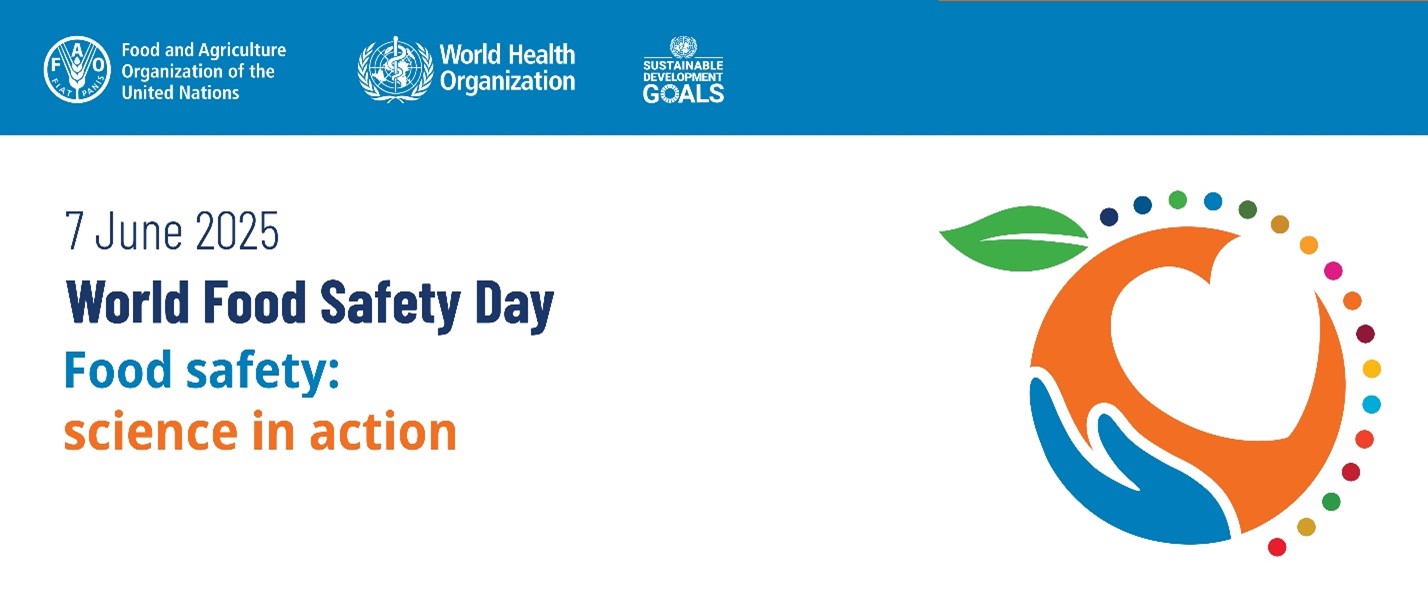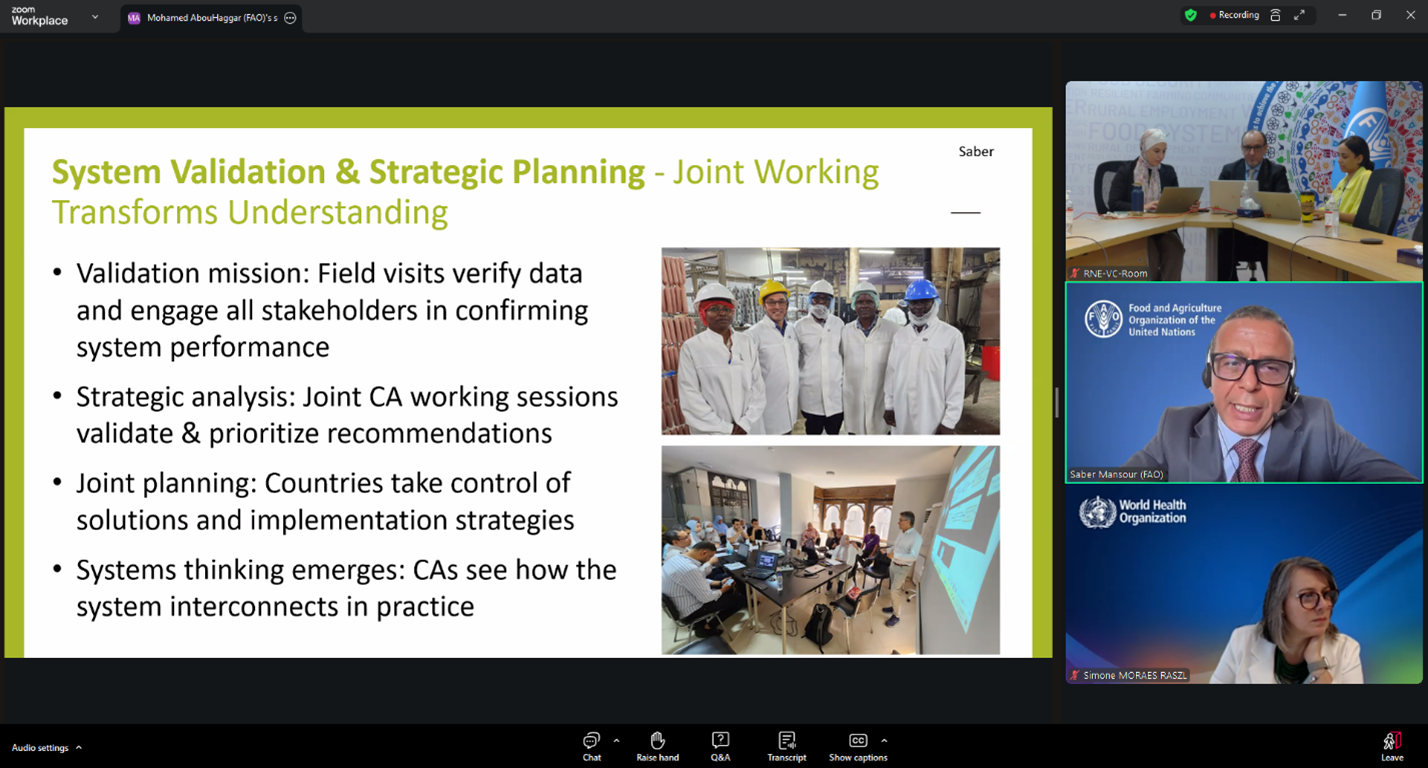Science in action: Regional webinar series marks the seventh World Food Safety Day 2025

©FAO
From 26 May to 25 August 2025, the Food and Agriculture Organization of the United Nations (FAO) Regional Office for the Near East and North Africa (RNE) and the World Health Organization (WHO) Regional Office for the Eastern Mediterranean (EMRO) co-organized a landmark series of eleven webinars to commemorate the Seventh World Food Safety Day under the theme “Food Safety: Science in Action.” series brought together hundreds of participants from across the Arab region and beyond, including scientists, researchers, senior officials, food industry representatives, and regulators.
Over the course of Eleven weeks, the sessions delved into a wide range of critical topics, from empowering decision-making through risk assessment, to balancing innovation and safety in risk-benefit evaluations and tackling antimicrobial resistance through innovative science. Participants gained insights into the essential role of laboratories in detecting hazards, strategies to influence consumer behavior through research, and the use of international tools such as the Joint FAO/WHO Expert Committee on Food Additives (JECFA) toolbox for veterinary drug residue risk assessment. Further discussions examined ways to build robust national food control systems, conduct environmental and epidemiological assessments during foodborne outbreaks, and strengthen surveillance capacities. Practical approaches to applying Good Hygiene Practices (GHP) and Hazard Analysis and Critical Control Points (HACCP) were demonstrated, alongside guidance on hygiene certification for food handlers. The series concluded with an exploration of safety considerations for novel foods, including cell-based meat and new protein sources.

Reflecting on the event’s success, Moustapha Mohamed, FAO Regional Food Safety and Quality Officer, noted, “By harnessing science and fostering regional collaboration, we are not only raising awareness of food safety but also providing professionals across the Arab region with the tools, knowledge, and confidence to act. This series has shown that science in action can directly translate into safer food for all.”
The webinar series successfully fulfilled its original objectives. It promoted best practices in adopting and implementing effective food safety measures by showcasing real-world applications and evidence-based strategies. It also significantly contributed to building the capacity of food safety professionals, particularly in emerging areas such as antimicrobial resistance, novel food safety assessments, and outbreak response. Furthermore, the initiative created a valuable and lasting resource: all webinars were recorded, with supporting materials compiled into a regional repository to serve as a reference for future training, policy development, and professional exchange.
By directly addressing the challenges and emerging trends in the Arab region, the series demonstrated that food safety is indeed everyone’s business. It reinforced the message that science must underpin every step of the food chain, from policy decisions and regulatory frameworks to consumer practices. Above all, it underscored the power of collaboration, between governments, international organizations, academia, and the private sector, in safeguarding public health and advancing the Sustainable Development Goals.
For the Arab region, World Food Safety Day 2025 was more than an annual observance, it was a powerful reminder of the shared responsibility to keep food safe every day of the year. It highlighted the urgency of continuous learning, vigilance, and application of science-based practices at every stage of the food chain. Food safety is not a once-a-year commitment; it is a daily practice that protects lives, sustains livelihoods, and strengthens the resilience of our agrifood systems.
Specific topics covered are as the following:
- Risk Assessment and Evidence-Based Strategies (26 May) – Participants learned how scientific data and risk assessment frameworks guide sound policy and industry practices.
- Risk-Benefit Assessment (2 June) – Experts examined how to weigh both the risks and advantages of new technologies and products in the food sector.
- Tackling Antimicrobial Resistance (16 June) – Innovative scientific approaches to combat one of the most pressing threats to public health were showcased.
- Food Safety Laboratories (23 June) – The session revealed the critical behind-the-scenes work of laboratories in detecting hazards and safeguarding consumers.
- Research for Consumer Behavior Change (30 June) – Insights on translating research into effective campaigns to encourage safe food handling and consumption.
- JECFA Toolbox for Veterinary Drug Residues (7 July) – Demonstrations of global tools for ensuring livestock-derived products meet safety standards.
- Foodborne Outbreak Assessments (21 July) – Case studies illustrated how coordinated food and environmental investigations can prevent future incidents.
- Foodborne Disease Surveillance (28 July) – Strategies for assessing national surveillance capacity and setting improvement priorities.
- Toolbox for Hygiene and HACCP (4 August) – Practical steps for implementing Good Hygiene Practices (GHP), Hazard Analysis and Critical Control Points (HACCP), and certification processes for food handlers.
- Novel Foods (11 August) – Discussions on safety assessments for emerging products such as cell-based meat and novel proteins.
- Building National Food Control Systems (25 August) – Practical guidance on strengthening national oversight using FAO/WHO’s assessment tool.
